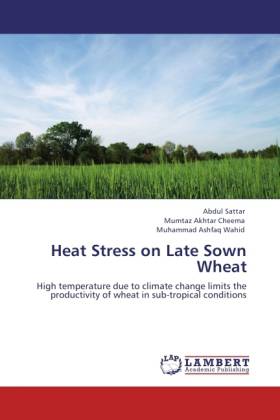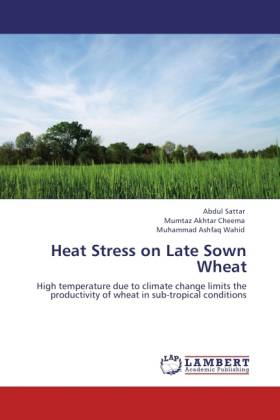
- Afhalen na 1 uur in een winkel met voorraad
- Gratis thuislevering in België vanaf € 30
- Ruim aanbod met 7 miljoen producten
- Afhalen na 1 uur in een winkel met voorraad
- Gratis thuislevering in België vanaf € 30
- Ruim aanbod met 7 miljoen producten
Zoeken
Heat Stress on Late Sown Wheat
High temperature due to climate change limits the productivity of wheat in sub-tropical conditions
Abdul Sattar, Mumtaz Akhtar Cheema, Muhammad Ashfaq Wahid
Paperback | Engels
€ 66,45
+ 132 punten
Omschrijving
Wheat (Triticum aestivum L.) is the most important and major cereal crop grown in Pakistan. As staple food of the people, occupying the central position in farming agriculture policies, it dominates all agronomic crops in terms of acreage and production. It is a principal source of carbohydrates and protein both for human beings and animals.Its grains contain carbohydrates 60-90 %, protein 8-15 %, fat 1.5-2.0 %, inorganic ions 1.2-2.0 % and 1 % vitamins such as B-complex and E. Climate change has been identified as the single most yield-reducing factor for wheat. It has many facets, including changes in long term trends in temperature. The impacts of these changing conditions on agriculture are already being seen, yet there are still considerable gaps in our knowledge of how agricultural systems will be affected by both short- and long-term changes in climate, and what implications these changes will have for rural livelihoods, particularly among the most vulnerable.
Specificaties
Betrokkenen
- Auteur(s):
- Uitgeverij:
Inhoud
- Aantal bladzijden:
- 84
- Taal:
- Engels
Eigenschappen
- Productcode (EAN):
- 9783845470573
- Verschijningsdatum:
- 22/09/2011
- Uitvoering:
- Paperback
- Afmetingen:
- 152 mm x 229 mm
- Gewicht:
- 136 g

Alleen bij Standaard Boekhandel
+ 132 punten op je klantenkaart van Standaard Boekhandel
Beoordelingen
We publiceren alleen reviews die voldoen aan de voorwaarden voor reviews. Bekijk onze voorwaarden voor reviews.







